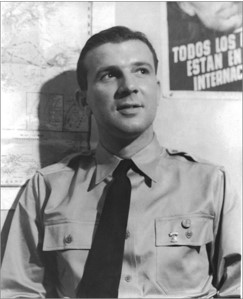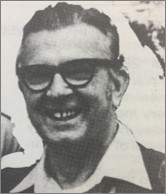Growing Up Scared: A Memoir
What was it like to grow up as the daughter of a Lincoln vet in Cold-War America?
I’m not like the other girls in my neighborhood. It’s not just because I’m Jewish, it’s because I have a secret.
Imagine knowing your parents could be taken away from you for their political beliefs. Imagine the FBI coming to your door and terrorizing you. This is one of my strongest childhood memories.
My sister and I shared many things, but it wasn’t until recently that we learned that we were both scared as children and young adults. When I was asked to write about growing up as the daughter of a veteran of the Abraham Lincoln Brigade, I was at once thrilled and scared at the same time. I live in Texas, which is a very conservative state. I didn’t wish to expose myself, but I finally realized that it was time.
I feel like I’ve been in hiding for most of my life, and that’s not a very good feeling. Very few people know what my childhood was like and frankly, I’ve not been inclined to share it.
When I was very young, I remember my parents talking about politics at home and admonishing us to NEVER discuss what we heard to anyone outside our family. My parents were both members of the Communist Party when my father got involved and decided to fight in the Spanish Civil War.
My sister and I hadn’t been born yet, however, my father’s decision to go to Spain and fight Fascism, made him and his family targets of the FBI. My father was in actuality a “little fish.” He wasn’t an organizer, or a leader during the war, but his name was on the government’s rolls as a Communist, not because he’d been a party member, but because of his decision to fight Fascism.
I remember a number of times when the FBI would come to our door and question our parents to see if they had been holding any political meetings. This was during the early 1950’s, the McCarthy era. The fear was everywhere.
We lived on the South side of Chicago, 7900 on LaSalle. It was a white middle-class neighborhood, with a few black families that moved in when I was in sixth or seventh grade. People in my neighborhood were mostly conservative Christians and a few Catholics. They didn’t discuss politics or religion and the consensus was that one “just didn’t do that.”
I was an outspoken child of 8, when I told some of my classmates that the FBI had come to our door. Evidently, one or more of the children told their parents and my mother had to come up to the school to talk to the principal. Honestly, I think the principal thought I was telling stories, my mother allowed the principal to think she was right, so our beliefs could remain hidden.
I learned at an early age to hide the truth about our family. Unfortunately, it gave me the impetus to see lying as a means to get along better with others. It took me a long time to finally come to terms with this and to this day, I have omitted many facts about my life when talking to others. I don’t actually lie; I just don’t reveal everything.
There were drawbacks, but also some real advantages to my upbringing. Both my parents believed education was everything. My father spoke out about how many of the world’s problems would be solved if people were educated and well informed. I remember going to a concert to hear Paul Robeson and getting to shake his hand, I was only about 3 or 4 years old. I remember sitting at Pete Seeger’s feet when he gave a concert to a small group of people. My sister and I attended a summer overnight camp called “Abraham Lincoln Center Camp.” It was a fully integrated camp in Janesville, Wisconsin, which had been part of the Underground Railroad. I was very young, about 7 or 8 years of age when I attended and in the 1950’s, an integrated camp was unheard of. It never crossed my mind that it was different from other camps. I attended for 2 years, and I think at the time, the name of the camp reminded me of the Abraham Lincoln Brigade.
Another advantage was being able to have real discussions with adults when I was still a child. We had many friends and acquaintances that were sympathetic to the same causes as my family. No one called people names, like so many do today. Even when people disagreed, they did so with grace and sometimes, humor. We believed and practiced the axiom that All Men Are Created Equal.
My father was a fervent believer in giving everyone a chance to improve themselves. One of his favorite sayings was, “You can’t tell a book by its cover.” He taught us to ignore what people looked like, that a person’s character was far more important. I was “color-blind.” I didn’t care if someone was a different color, race, religion, or political belief; I only cared about them as an individual. Thanks to this upbringing, I have not changed the way I view other people.
Finally, because we were raised in a family that fought against fascism, we always sought to right any wrongs we felt were happening. I remember marching against segregation in the early 60’s, writing letters to various leaders, supporting causes and marching for peace. I was and am basically a pacifist. Even though my father fought against Fascism in Spain, he felt that war was not the answer to the world’s problems. So to continue his and my mother’s legacy, I will always stand up for my fellow man and keep myself informed on what is happening in the world.
My father lived long enough to see Franco pass away and to see hope for the future of Spain and the rest of the world. He died in March 1978.
Margo Szermeta is the daughter of Ernest J. Romero.
Margo and her sister Dolores have another connection to the Abraham Lincoln Brigade: their stepmother Lois Lord Romero was married to Nathan Meyer Schilling. Lois and Nathan met at the University of Chicago and married in April 1937. The couple were still newlyweds when Nathan volunteered to serve in the International Brigades. Nathan sailed to Europe bound for Spain on May 15 the same year. In Spain, he was attached to the newly formed Mackenzie-Papineau Battalion and received training as a sniper. He was killed in his first action at Fuentes de Ebro on October 13, 1937. A month later Lois received the news that she was widow. In an interview she stated that “Humanity and progress meant more to him than life.” When asked if she was sorry that he went she stated “I’m not sorry he went. It’s what we both felt he should do.” —Chris Brooks














